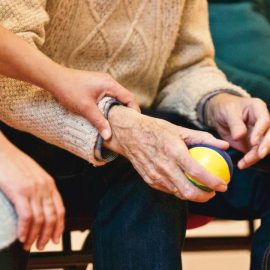

This article is an excerpt from the Shortform book guide to "The Power of Positive Thinking" by Norman Vincent Peale. Shortform has the world's best summaries and analyses of books you should be reading.
Like this article? Sign up for a free trial here .
How do you get people to like you? What is it about likable people that makes them that way?
We all want to be liked and socially accepted—it’s a fundamental longing. Psychologist William James once said, “One of the deepest drives of human nature is the desire to be appreciated.” Though you won’t get everyone to like you, there are ways to make yourself into a person who gets along well with others, even if you’re not very social or are considered “difficult.”
In this article, we’ll explore what it takes to become likable, drawing on sources from popular literature.
A “Comfortable Person” Is Well-Liked
No matter what your life has been like, you can become a well-liked, popular person. Becoming well-liked is a skill that can be developed.
First, be easygoing and natural; be someone other people can be around without a sense of strain. Peale calls this being a “comfortable person.” When you’re too reserved and stiff, people don’t know how to act or what to say around you.
If you’re not a “comfortable person,” look inward. Don’t assume people don’t like you because something is wrong with them—assume the trouble lies with you. Be honest about your less-than-attractive personality traits and know they can be changed.
To get other people to like you, you have to like them, and this isn’t always easy. Some people are a lot less likable than others. Understand that when you get to know anyone, even someone who isn’t likable on the surface, you’ll find admirable and loveable qualities.
To do this, develop a sincere interest in and love for people. Once you can develop this trait, other positive traits like kindness and generosity will follow.
| How to Be Liked by Everyone: Love Yourself First Being a comfortable person requires being comfortable with yourself. Any number of self-help books advise us to accept and love ourselves just as we are (while recognizing that there’s always room for improvement), but we can go too far in the opposite direction. In No More Mr. Nice Guy, Robert Glover discusses the so-called “Nice Guy” phenomenon, wherein people (particularly men) fall into a cycle of people-pleasing: Trying to make others happy with no regard for their own needs. “Nice Guys” think that, if they make others happy, those people will naturally reciprocate by giving them what they want—and they can get extremely angry if that doesn’t happen. Furthermore, their people-pleasing behavior often comes off as insincere or desperate. Therefore, Glover’s advice for how to be liked is to put yourself first: Be honest with yourself and others about your needs, and don’t be afraid of rejection or scorn. According to Glover, when you meet your own needs first, people will find you much easier to be around. That’s because you aren’t relying on others to meet those needs, and you don’t have ulterior motives for your friendly behavior. In The Subtle Art of Not Giving a F*ck, Mark Manson says something similar: You can’t control what other people think of you, and it’s unhealthy to try. For that reason, Manson says that popularity is a negative value—something that will hurt you and the people around you if you pursue it. Instead, Manson says that you should turn your focus inward; work on becoming happy and comfortable with yourself, and others will find you more likable. |
Make People Feel Important
Another factor in getting people to like you is to build up their ego. Everyone wants to feel important. Think about how you feel when someone deflates your ego; you feel wounded and disrespected, and you won’t like that person very much.
Imagine someone telling a joke to a group of people. Everyone laughs, except you. You tell everyone you heard that joke a month ago. Nobody in that group is going to like you much; you deflated a person’s moment and took away their joy.
When you build people up, they’ll feel respected, and they’ll love you for it. If someone contributes to your self-respect and self-worth, they are helping you be your best self, and you’ll be grateful toward them.
Build up as many people as you can; let them know the possibilities you see in them and the genuine love you have for them. They’ll reward you with their own respect and affection.
| Dale Carnegie’s classic book How to Win Friends and Influence People says that everybody likes to feel important, so one of the surest ways to get someone to like you is to stroke his or her ego. Carnegie adds that the effect is especially strong with people who often get overlooked and dismissed. For example, elderly people and people who work customer service jobs are frequently looked down on by others; those are the people who will most appreciate it if you take a moment to build up their self-esteem. |

———End of Preview———
Like what you just read? Read the rest of the world's best book summary and analysis of Norman Vincent Peale's "The Power of Positive Thinking" at Shortform .
Here's what you'll find in our full The Power of Positive Thinking summary :
- That there is no problem or obstacle you can’t overcome with faith, positive thinking, and prayer
- The practical techniques of applied Christianity
- How to take control of the events in your life rather than be directed by them






